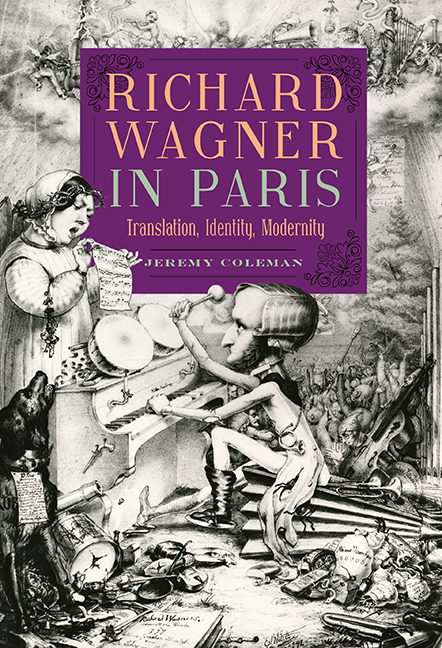Book contents
- Frontmatter
- Dedication
- Contents
- List of Illustrations
- List of Music Examples
- Note on the Text
- Acknowledgements
- Abbreviations
- Introduction: Wagner Against the Grain
- PART I PARIS YEARS, 1839–42
- 1 Through Babel's Arcades: Early Entanglements
- 2 Translating German Opera: Le Freyschütz
- PART II DRESDEN AND ZURICH, 1842–52
- PART III PARIS YEARS, 1859–61
- Conclusion: Universality at the Crossroads
- Bibliography
- Index
1 - Through Babel's Arcades: Early Entanglements
from PART I - PARIS YEARS, 1839–42
Published online by Cambridge University Press: 25 March 2020
- Frontmatter
- Dedication
- Contents
- List of Illustrations
- List of Music Examples
- Note on the Text
- Acknowledgements
- Abbreviations
- Introduction: Wagner Against the Grain
- PART I PARIS YEARS, 1839–42
- 1 Through Babel's Arcades: Early Entanglements
- 2 Translating German Opera: Le Freyschütz
- PART II DRESDEN AND ZURICH, 1842–52
- PART III PARIS YEARS, 1859–61
- Conclusion: Universality at the Crossroads
- Bibliography
- Index
Summary
WAGNER'S first sojourn in Paris between 1839 and 1842 was by any measure a critically formative period in his artistic and social development and its influence has often been traced to his mature stage works, wider theatrical ambition and political views. But it may be considered in the first instance within a number of discursive and ideological formations which extend further back into the 1830s, in the aftermath of the July Revolution. In short, Wagner was attracted to Paris on the one hand as a Young German radical émigré and would-be exile, and on the other as an ambitious, internationally orientated German composer of opera. This chapter takes as its chronological purview the period from his arrival in Paris in September 1839 to the publication of his first articles in the Revue et Gazette musicale de Paris (hereafter RGMP) in summer 1840. It begins, however, with the preparations he made practically and the nationalist discourses and autobiographical fantasies that sustained them.
Wagner's initial desire from the mid-1830s to try his luck in Europe's capital city of opera has been explained away by previous commentators as cynically meretricious. Such claims unwittingly reproduce Wagner's own autobiographical self-image, which in this case insisted that he had responded only to outward financial pressure while remaining inwardly set against a Parisian success of any kind from the start. His correspondence from these years suggests more complex reasons. On 27 October 1834 he wrote to his boyhood friend Theodor Apel spelling out plans to travel in Europe with Apel once Die Feen and Das Liebesverbot (then still in progress) had been performed in Germany. He would write an Italian opera in Italy and:
when we are sun-tanned & strong again, we shall turn our gaze towards France, I'll write a French opera in Paris, and God alone knows where I'll end up then! But at least I know who I shall be – no longer a German philistine.
This projected autobiographical narrative in conscious imitation of Meyerbeer's actual career from Germany to Paris via Italy through the respective national styles of operatic composition had as much to do with his erstwhile admiration for Meyerbeer as a universal German genius as it was a feature of the Young German literary movement.
- Type
- Chapter
- Information
- Richard Wagner in ParisTranslation, Identity, Modernity, pp. 21 - 50Publisher: Boydell & BrewerPrint publication year: 2019



